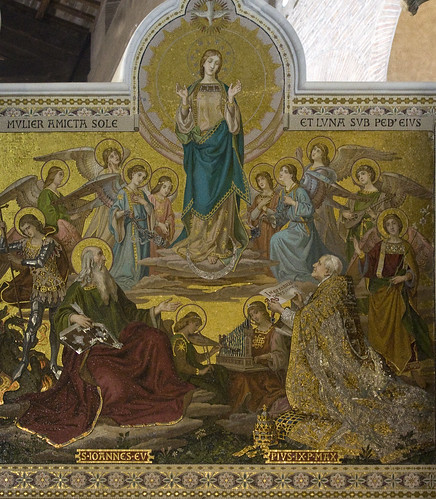Readings: Isaiah 61: 1-2, 10-11; Luke 1: 46-55; 1 Thessalonians 5: 16-24; John 1: 6-8, 19-28
 Today is Gaudete Sunday, named after the Latin word “Rejoice!” or ‘Be joyful!’ Joy is or expresses a sense of well-being, a fullness of blessing, gratitude, confidence, assurance, celebration, and may be more exuberant or peaceful depending on the person and situation. Joy in some way takes you out of yourself and focuses your attention on another. You cease to become pre-occupied with yourself and are occupied joyfully with another.
Today is Gaudete Sunday, named after the Latin word “Rejoice!” or ‘Be joyful!’ Joy is or expresses a sense of well-being, a fullness of blessing, gratitude, confidence, assurance, celebration, and may be more exuberant or peaceful depending on the person and situation. Joy in some way takes you out of yourself and focuses your attention on another. You cease to become pre-occupied with yourself and are occupied joyfully with another.
Joy certainly involves emotion but can it be spiritual? There are plenty of references in the psalms to people being joyful owing to their relationship with God. Joy flows from God's presence to them - and them to him. It is the pleasure that God takes in people, and in acting on their behalf and blessing them.
Is there such a thing or quality as Christian joy? Paul thought so and lists it as one of the fruit of the Holy Spirit (Gal 5: 22). As we read today, Paul thought it important enough to encourage the Thessalonians: "Always be joyful! (1 Thes 5:16)"
Real Christian joy is based on Christ's Risen presence to us which transforms everything if we let it. He comes to us with his blessings and the joy he takes in us. Advent is a time for us to come more and more into the presence of God who comes to us anew. The Lord says to us: "Rejoice in my presence. I am present to your hearts - to your deepest self where I dwell. Do not overlook this or turn away. Let me also be present to your mind, your conscience, your conduct. Let my presence grow and be fully manifest. Grow in my presence and in your presence to me - by your joyful and loving attention and trusting surrender to me and my will." This is close to the advice of the section of Paul’s letter to the Thessalonians that we read today. This joy in God flows to and from the joy we see in goodness around us, in others or the world, both of which come from the goodness of God. Joy increases the more things are seen in a divine light, the more we orientate ourselves and our priorities towards God and let the joy that comes from God be our strength. But we can seek joy in the wrong things. Jesus, and Scripture generally, indicate that such joy does not last.
 Mary in her Magnificat (today’s psalm) expresses the joy of someone whose life is focussed on God. Today’s gospel with its call by John the Baptist to repent and make our paths straight for God and its challenge that, like John, we realise how small we are before God also tells us how to be joyful. I think John the Baptist would have endorsed the following anagram of J-O-Y for what our priorities ought to be – had he only known English! According to it, our priorities need to be: J - Jesus firstly; O - others, secondly; and Y - yourself, last. Then we will be ready for the Lord. We will also be able to rejoice in him now and always!
Mary in her Magnificat (today’s psalm) expresses the joy of someone whose life is focussed on God. Today’s gospel with its call by John the Baptist to repent and make our paths straight for God and its challenge that, like John, we realise how small we are before God also tells us how to be joyful. I think John the Baptist would have endorsed the following anagram of J-O-Y for what our priorities ought to be – had he only known English! According to it, our priorities need to be: J - Jesus firstly; O - others, secondly; and Y - yourself, last. Then we will be ready for the Lord. We will also be able to rejoice in him now and always!

 What if we do accept the notion of original sin, though? What is the significance of Mary’s Immaculate Conception? Well, we must remember that the Immaculate Conception was not an isolated event, but the beginning of a life entirely without sin, a life entirely in accordance with God’s will. In saying that Mary was free from sin from the first moment of her conception, we are saying something about the primacy of God’s love over sin and death; that same love which we see revealed when the Son of God dies upon the Cross, we see too in its power to preserve the Mother of God completely from the stain of sin.
What if we do accept the notion of original sin, though? What is the significance of Mary’s Immaculate Conception? Well, we must remember that the Immaculate Conception was not an isolated event, but the beginning of a life entirely without sin, a life entirely in accordance with God’s will. In saying that Mary was free from sin from the first moment of her conception, we are saying something about the primacy of God’s love over sin and death; that same love which we see revealed when the Son of God dies upon the Cross, we see too in its power to preserve the Mother of God completely from the stain of sin.

